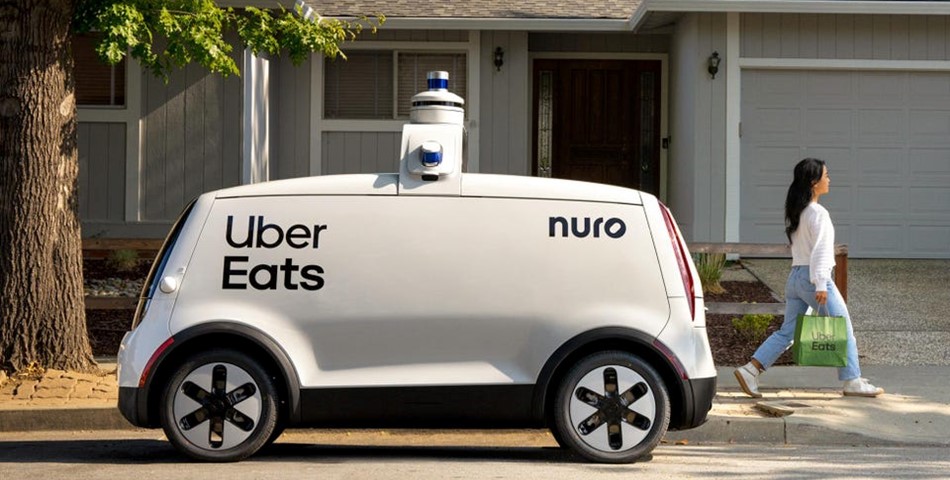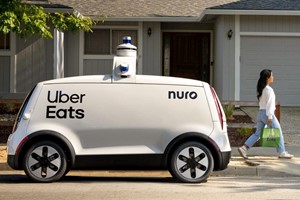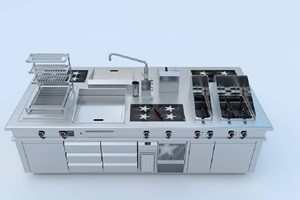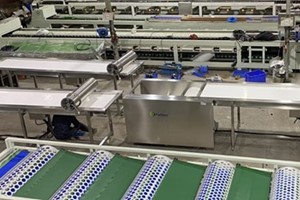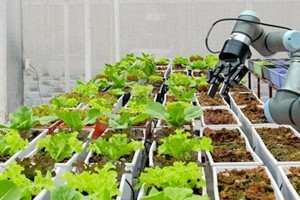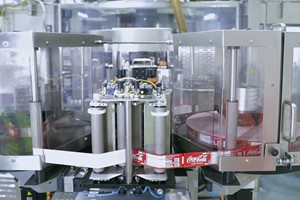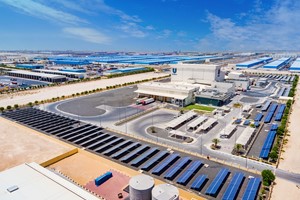Nuro, a Softbank-backed developer of street-legal autonomous, electric delivery vehicles, has struck a long-term partnership with Uber to use its toaster-shaped micro-vans to haul food orders, groceries and other goods to customers in Silicon Valley and Houston using the Uber Eats service starting this year.
People using the Uber Eats app in Houston and Mountain View, California (where Nuro is based) will be able to order deliveries using the new autonomous service this fall, with plans to expand the program to other parts of the San Francisco Bay Area in the months ahead, the companies said. The vehicles alert people when they arrive, at which point the customer inputs a code to open the compartment containing their order.
Nuro declined to share financial details of the 10-year agreement with Uber and also didn’t specify how many of its new Nuro vehicles will be deployed in the program. The combination of its technology and Uber’s scale means “we can expand food delivery options from your favorite local mom-and-pop restaurants all the way to nationwide chains,” Cosimo Leipold, Nuro’s head of partnerships, said in a statement.
Created by two of the original members of Google’s self-driving car project in 2016, Nuro’s focus is on relatively low-speed, last-mile delivery services in urban and suburban areas, rather than robotaxis or autonomous semi-trucks. The company has also been a prodigious fundraiser, hauling in more than $2 billion to build up operations.
Its new Nuro autonomous vehicles, loaded with laser lidar sensors, cameras and radar and able to travel up to 45 miles per hour, are being built at the company’s new assembly facility near Las Vegas, with batteries and key components being supplied by battery and electric-vehicle maker BYD. They lack steering wheels, accelerator and brake pedals and other conventional controls and have received approval from California and the U.S. Transportation Department to operate on public roads.
Prior to its partnership with Uber, Nuro has operated numerous pilot delivery projects with companies and services including FedEx, Walmart, CVS, Kroger and Domino’s Pizza in Texas, Arizona and California. It also counts Chipotle as an investor. It has the potential to work with vastly more merchants as a result of the new alliance, as there are more than 825,000 in the 11,000 cities worldwide on the Uber Eats platform, the companies said.
Nuro, which is valued at $8.6 billion, was founded in 2016 by Dave Ferguson and Jiajun Zhu, two veterans of the Google self-driving car project that would go on to become Waymo. It is one of the few companies to be operating fully driverless vehicles — that is, vehicles without safety drivers behind the wheel — on public roads today. It was the first company to receive a special exemption from certain federal safety requirements and was also the first to charge money for its driverless deliveries in California.
The permit, issued by the California DMV, only allows the company to operate its delivery service in parts of Santa Clara and San Mateo counties, which would mean most of the Silicon Valley and its tech workers would be within its domain but not San Francisco or Oakland. That means the company will need to obtain additional permission from the DMV before expanding its service area.
Nuro isn’t the only autonomous delivery company to work with Uber. The company is also working with Serve Robotics and Motional to test out robot deliveries. Serve Robotics operates delivery robots that travel on sidewalks, while Motional uses electric Hyundai Ioniq 5 SUVs with two safety drivers in the front seats. Serve and Motional’s respective pilots with Uber Eats are available to customers in the Los Angeles area.




